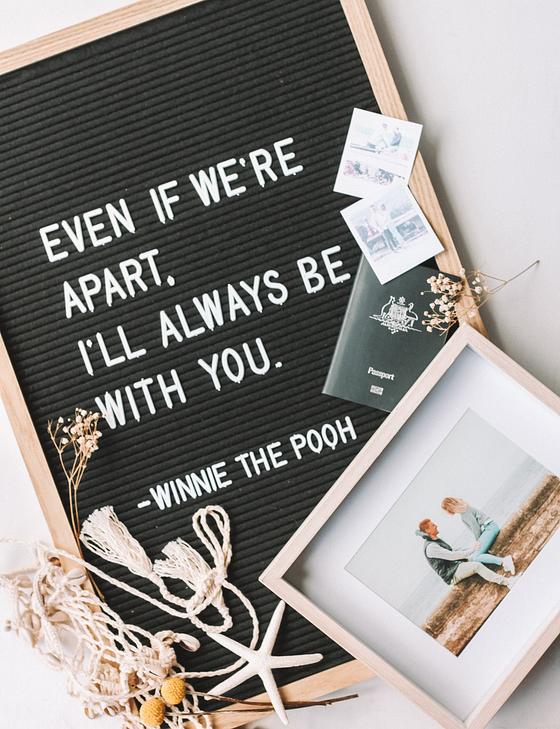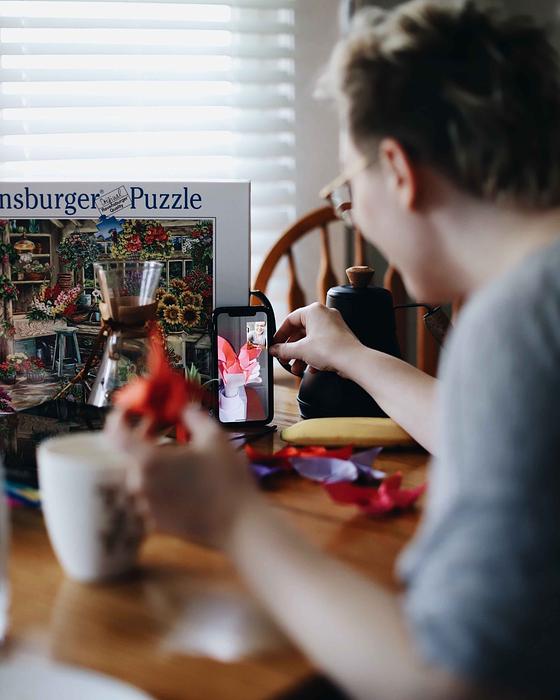Nothing is more painful than being physically separated from someone you love, whether it's due to traveling to different cities, attending different colleges, or having different jobs. In reality, most people will probably be in a long-distance relationship with a partner at some point.
When a long-distance relationship is not working, one might feel constantly on edge from the lack of security, experience frequent miscommunication, and be upset by the lack of in-person contact. But on the other hand, a secure and loving long-distance relationship can allow an individual to experience a healthy balance of independence, time with friends and family, and love and romance with a partner.
Long-distance relationships are often complex because it allows one to reflect more closely on how the relationship is going and might highlight communication issues that were once unnoticed when people could see their partner all the time. If you and your partner have been in a relationship for a long time, the long distance might be relatively easier than if you had just begun dating. But regardless, here is some advice and healthy habits that anyone in a long-distance relationship will benefit from.

Photo by Nancy Nguyen
1. Continue to get to know each other
Just like being in an in-person relationship, you and your partner should continue to learn about each other. It might be helpful to have conversations about attachment styles, personality types, love languages, etc. There are plenty of short quizzes you can take online to help you understand yourself and your partner in these areas.
Of course, you should not solely rely on these results, but knowing these things can initiate conversations that would help with communication, conflict resolution, and overall satisfaction with the relationship. It is also that you and your partner continue to have meaningful conversations. For example, what do you value the most? What are your favorite memories? What are your short-term and long-term goals, both personal and professional? It is valuable to discuss more vulnerable things as well. For instance, what do you fear the most? What are the difficult experiences you have had to get through, and how have they shaped you? Getting to know each other deeply allows you to grow together and support each other through your experiences and endeavors.
2. Maintain routines and scheduled activities
Perhaps what you would miss the most in a long-distance relationship is doing things with your partner — watching a movie in your bedroom on the weekends or studying together on a weeknight. But just because your partner isn't physically there, it doesn't mean you now have to do all these activities alone. Some activities you can do with your partner include watching your favorite shows and movies online, trying out each other's hobbies, or calling each other while cooking.
If you and your partner are busy and have different schedules, it can be challenging to make time for each other and stay in contact consistently. This is why making time each week designated for calling or doing activities together is an important part of long-distance, plus this way, you have something to look forward to each week.

Photo by Maddi Bazzocco
3. Communicate Clearly and Effectively
When you begin a long-distance relationship, you should communicate your expectations and boundaries —for example, how frequently should we expect each other to reply to our messages? How much should we share with each other? What is considered cheating? This ensures transparency and allows the relationship to work out more smoothly.
Communication via texting or calling is more challenging than in-person communication. There is much more room for misunderstandings regarding someone's tone and intentions. When addressing an issue, you should be calm and direct instead of aggressive or passive-aggressive — it makes the process much smoother and lower stress for both people involved.
And do not assume that your partner has bad intentions, because hostility and impulsivity would only worsen your relationship. Instead, be patient in listening to what your partner has to say and communicating your thoughts so that your partner also understands your perspective. We are all humans who make mistakes, and conflicts are a normal part of interacting with someone intimately. Being kind and understanding when conflicts arise allows both people to learn from this experience and feel closer to each other.
It also helps to check in occasionally with your partner about how you feel about long distances. This way, you can ensure you and your partner are on the same page and adjust anything that might not work.
4. Balance time spent separately and time spent together
In a relationship, it is easy to want to spend every minute of your time with your partner. When the relationship becomes long-distance, it can turn into being on your phone and texting your partner all the time, sharing every mundane detail in your life, calling for hours, etc. While one should maintain close contact with their partner, too much contact could become draining and unsustainable in the long run.
Because at the end of the day, you are an individual with your own life to live. No matter how much you love your partner and have faith in your relationship, you will only live a fulfilling, happy life if you value all aspects of your life instead of just your relationship. It is important, therefore, to be present and enjoy every moment you spend while also cherishing the joy of sharing your life with a partner.
Another significant aspect of keeping a long-distance relationship enjoyable is having your own friends you can see often and your own hobbies that are separate from your partner. Since your primary way of communication with your partner is virtual, it is vital to have quality time in-person with friends and family to have a fulfilling, balanced social life. Of course, you should not neglect your partner and make them feel like they no longer play a central role in your life, so figuring out how much contact you and your partner feel most comfortable with is key.
5. Plan out times to visit each other
Knowing when you can see each other next is like the light at the end of a tunnel — it gives you hope and something to look forward to. Otherwise, you might feel like you are losing your partner or that your relationship only exists online instead of in reality. Make sure each visit is planned beforehand so you can enjoy it fully.
For example, you can make reservations at your favorite restaurant that you want your partner to try or attend an event together. Remembering important dates, like anniversaries, birthdays, or Valentine's Day, and making plans to visit each other during those dates can feel extra special. Depending on your unique circumstances, you should also communicate your long-term plans —maybe you plan to attend the same college one day or move to the same city for work in a few years. This way, your future can feel a little more predictable.

Photo by Becca Tappert
6. Find ways to create mutual support, security, and trust
The key to keeping a long-lasting relationship is keeping up the same level of emotional support you and your partner had virtually. Of course, you should not rely solely on your partner —your friends and family are important people you can turn to for support too. Still, your partner should be somebody you can feel comfortable sharing vulnerable things with.
Make sure to let your partner know about what you are going through, and be there for them when they are experiencing challenges. Even if you cannot directly intervene to help, offering an empathetic ear, validating their emotions, and talking through things together allows you and your partner to maintain intimacy and trust.
7. Be committed
Commitment ultimately allows you and your partner to sustain your relationship and combat all the difficult times and loneliness you might experience from time to time instead of giving up on the relationship when an argument arises or leaving your partner for an in-person relationship. When you and your partner are committed to each other, you can feel even closer to them than you were when you were able to see each other often, instead of constantly living in doubt about the future or whether your partner might meet someone better.

Photo by Tabitha Turner
No matter how hard you and your partner try to make this work, understand that it is OK, from time to time, to miss your partner intensely, to question whether or not it's worth it, and to be anxious about what the future holds. When you do, acknowledge your feelings and try to focus on the present and the fact that, no matter what the future holds, you still have your partner in the present whom you love and feel loved by.
Hopefully, knowing these strategies will help you feel better about long-distance relationships. Many of these tips, like communicating clearly and scheduling time spent with each other, are crucial for all relationships, not just long-distance ones.















.jpeg)
